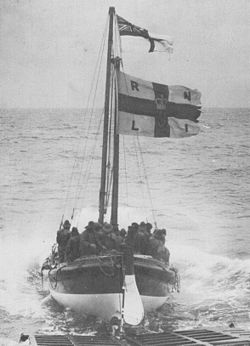RNLB H F Bailey (ON 670) was the first Royal National Lifeboat Institution (RNLI) lifeboat powered by a motor, that served from Cromer Lifeboat Station.
 H.F. Bailey ON670
| |
| History | |
|---|---|
| Owner | Royal National Lifeboat Institution (RNLI) |
| Builder | J. Samuel White at Cowes on the Isle of Wight. |
| Official Number | ON 670 |
| Donor | Legacy of Henry Francis Bailey, Brockenhurst, Surrey. |
| Station | Cromer |
| Laid down | 1923 |
| Fate | Moved to Great Yarmouth & Gorleston on 5 May 1924, where she served until 1939 |
| General characteristics | |
| Type | ‘Norfolk & Suffolk’ type |
| Length | 46 ft 6 in (14.17 m) overall |
| Beam | 12 ft 9 in (3.89 m) |
| Installed power | Single Weyburn Diesel engine of 80 bhp (60 kW) |
Description
editThe lifeboat was built in 1923 by J. Samuel White at Cowes on the Isle of Wight. The lifeboat was powered by an 80 bhp Weyburn DE6 engine and was a Norfolk and Suffolk-class lifeboat. She was 46 feet (14 m) and 6 inches (150 mm) long with a breadth of 12 feet 9 inches (3.89 m)
Donor
editThe Cromer station had four motor-powered lifeboats all called H F Bailey, after the donor, a Mr Henry Francis Bailey of Brockenhurst,[1] a London merchant who was born in Norfolk and had died in 1916.
New boathouse
editTo accommodate this new motor lifeboat a new lifeboat house and slipway were built on the end of the Cromer Pier.[2] The planning and building of this new boathouse was carried out three years before the arrival of H F Bailey and was ready[2] on the day that the new lifeboat arrived in the town. The new house was 60 feet (18 m) long and 21 feet (6.4 m) wide.[2] The house had a solid concrete[2] floor. The placing of this house at the end of the towns pier allowed the new lifeboat to be launched at all states and conditions of the tide, and with the pier itself 500 feet (150 m) from the shore line plus the 60 feet (18 m) of the boathouse and a further 165 feet (50 m) of slipway meant that the lifeboat when launched would be well clear of the rocks and groynes along Cromer's beach front.[2] The new lifeboat house cost £32,000.[2] This boathouse remained in constant use until 1995 finally being replaced with a new station in 1999.[2] The 1923 station now resides at Southwold.
Service and rescues
editH F Bailey (ON 670) was the Cromer No. 1 boat on station for just one year but due to problems with her launch and recovery, on the slipway, she was transferred to Great Yarmouth & Gorleston on 5 May 1924, where she served until 1939
| Year | Date | Casualty | Lives saved |
|---|---|---|---|
| 1923 | 19 July | Smack Hepatica of Lowestoft, assisted to save vessel | |
| 1924 | 1 January | Steamship Nephrite of Glasgow, assisted to save vessel | 12 |